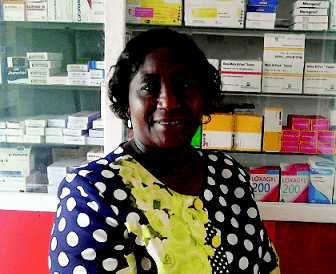Pharm. Margaret Bolanle Salako is the immediate past chairman, Association of Community Pharmacists of Nigeria (ACPN), Oyo State Chapter. A merit award and national merit award winner of both the Pharmaceutical Society of Nigeria (PSN), Oyo State Chapter and the Association of Lady Pharmacists (ALPs), respectively, Pharm. Salako has served the profession in several other capacities in the state. These include being chairperson, Association of Lady Pharmacists (ALPs); treasurer, Association of Community Pharmacists (ACPN); treasurer, Pharmaceutical Society of Nigeria (PSN); and vice chairman, ACPN. She is the managing director and superintendent pharmacist of Boset Pharmacy, Apata, Ibadan, Oyo State.
In this exclusive interview with Pharmanews, the 1983 pharmacy graduate of the Obafemi Awolowo University, Ile-Ife, expresses concern over the state of health care in Oyo State, while urging pharmacists generally to live up to the standard expected of them. Excerpts:
When did you establish Boset Pharmacy and how was it at the beginning?
Boset Pharmacy Limited was established In 1986 after my National Youth Service programme. Although it was tough and rough at the beginning, I was very passionate about making it work. The joy of being a young entrepreneur and the opportunity to serve my community were what kept me going.
Those were days when we kept buying the same items from the wholesalers twice a day because we couldn’t afford buying in bulk. The little money available was spread over several items just to make sure that none of the drug was out of stock. At that time, there were no company representatives selling to retailers as we have today; but we always bought from the wholesalers and drug distributors and the market was not as chaotic as we have now.
Much support has also come from my husband, Rev. Joseph Olusegun Salako, who is also a pharmacist. With his full support, the business kept growing steadily.
As a Stakeholder, how would you assess community pharmacy practice in Oyo State?
Community practice has now shifted from just mere buying and selling to a more patient-oriented service. In Oyo State, we had series of seminars and workshops to enhance pharmaceutical care and professionalism. Gone are the days when you will be absent from your premises and make money. Now patients and clients demand to see the pharmacist on duty and they are better served. Health checks and health promotions are also the order of the day and community pharmacists are now busier with counselling of patients and pharmaceutical care.
Few months have passed since you handed over as ACPN Chairman in Oyo State, how would you describe your chairmanship experience?
The experience was quite interesting but very challenging. Looking back, I can only give all the glory to God for a fulfilled tenure marked with stories of success. I remember when I was approached to take up the mantle of leadership, I was quite hesitant, considering the herculean task of being in front of an association as complex as ACPN. That aside, I was also called upon to lead at a time when I was going through some personal challenges. Looking back, however, I know it could have only been by the grace of God and I give Him all the glory.
Can you recall some of your achievements and challenges?
As chairman, I worked hard to ensure the birth of a wholesales outlet, in line with the NDDGs, and the shareholders were majorly members of ACPN. We encouraged and ensured the installation of not less than 25 Electro Kingdom softwares at different pharmacies for inventory control, record-keeping (both for clients and for the businesses). We empowered the Pharmaceutical Inspection Committee in the state in order to enhance their activities. We turned our monthly meetings to scientific meetings and value-adding opportunities so as to improve the quality of practice in the state. We ensured good collaboration with regulators, such as NAFDAC, Pharmacists Council of Nigeria , NDLEA and the police.
In addition, Oyo ACPN was always among the first three positions at the Group Dynamics at the ACPN national conferences because we always observed the World Health Organisation (WHO) days and participated in many community development programmes.
There are complaints that many pharmacists are not meeting up with the globally accepted standard of the profession, what can you say about this?
As a pharmacist myself, the expected standard of any pharmacist include provision of quality pharmaceutical services to the patient; provision of genuine medicines; provision of patient counselling and other aspects of pharmaceutical care; provision of drug information services to health care practitioners and the community; health promotion services; carrying out patient monitoring; as well as involvement in the care of the patient.
Any pharmacist that is not rendering these services surely will not be measuring up to expectations and people are bound to complain. However, in Oyo State, our monthly meetings are geared towards encouraging and equipping our members towards meeting all these expectations and very many pharmacies are doing exactly this.
What can you say about the state of the health sector in Oyo State?
Things are not what they are supposed to be; so there is need for improvement in all areas of health care delivery in the state.
What is your view about pharmacists in politics?
I am of the opinion that politics can be a very crucial and timely agent of betterment and advancement for the pharmacy profession. Moreover, politics cannot be divorced from general administration and policy formulation. I therefore would like to see more pharmacists participate in politics. We should try to encourage more of our members to take part in Nigerian politics either by seeking political appointments or by contesting elections. Our chances are brighter as professionals when we have our representatives in good number both at the legislative and the executive levels of government.











